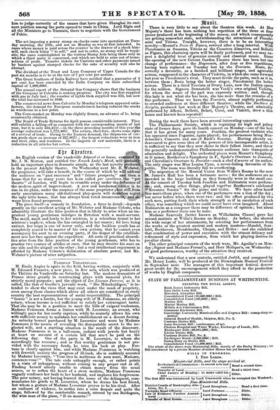uar.
There is very little to say about the theatres this week. At Her Majesty's there has been nothing but repetition of the three or four pieces produced at the beginning of the season, and which consequently are getting somewhat stale, notwithstanding the attractions of Piccolo- mini and Titiens. Tonight, however, there is to be an interesting novelty—Mozart's Hoz.te di Figaro, revived after a long interval. With Piccolomini as Susanna, Titiens as the Countess Almaviva, and Belletti as Figaro, this charming opera will be finely performed; and we may ex- pect a delightful- treat of genuine comedy and classical music. Since the opening of the new Covent Garden Theatre there has been but one change of performance : the Huguenots, after four or five repetitions, having been replaced on Tuesday last by the 7'rariata. Beale, de- servedly a favourite, as a finished and brilliant singer, and agreeable actress, reappeared in the character of Violetta, in which she came forward last year as Piceolomini's rival. They must divide the palm, such as it is, between them ; Bosio being the better singer, Piccolomini the better actress. There is a third Traviata at Drury Lane, now the Italian opera for the million Signora Donnatclli was Verdi's own original Violetta, for whom the music of the part was expressly written : and, though this lady is not what she has been, she has more than the remains of a fine performer. Thus we have the Traviata, almost nightly performed to crowded audiences at three different theatres ; while the Barbiere di Siviglia, produced last week at Her Majesty's Theatre, and admirably performed by Alboni, Belletti, Belart, Corsi, and Vialetti, drew a thin house and has not been repeated !
During the week there have been several interesting concerts.
The Philharmonic Society, which is regaining its high and palmy state of former days, gave its fourth concert on Monday—one of the best that it has given for many years. Joachim, the greatest violinist who has appeared since Paganini, again played ; his performances being Men- delssohn's Concerto and one of Bach's Sonatas. Having already en- deavoured to give some idea of the powers of this incomparable artist, it is sufficient to say that they now shone in their fullest lustre, and threw the generally undemonstrative Philharmonic audience into transports of admiration and delight. The orchestral pieces were Mozart's Symphony in G minor, Beethoven's Symphony in F, Spohr's Overture to Jessonda, and Cherubini's Overture to l'aniska—each a chef d'oeuvre of its author. The only singer was Miss Louisa Pyne, a never-failing favourite of the public. The room was literally full to overflowing. The migration of the Musical Union from Willis's Rooms to the new St. James's Hall has been a fortunate move • for the audiences are as crowded in the large building as they formerly were in the small one. At the concert of Tuesday both Joachim and Rubinstein were perform- ers_; and, among other things, played together Beethoven's celebrated " Kreutzer Sonata " for the piano and violin. We have often heard this marvellous piece, when one of the performers was a lion of the day ; but never before when there were two : and the effect produced by two such men, putting forth their whole strength as if in emulation of each other, was something which we could never have even imagined. About Rubinstein as a composer there may be difference of opinion ; but about him as a performer there can be none.
Madame Szarvady (better known as Wllhelmina Clauss) gave her second matinee at Willis's Rooms on Monday. As before, she showed the wide range of her attainments, by selecting her performances from the works of the greatest ancient and modem masters—Handel, Scar- latti, Beethoven, Mendelssohn, Chopin, and Heller : and she exhibited that combination of power and execution with the utmost delicacy and refinement of style and expression, from which her playing derives its peculiar charm. The other principal concerts of the week were, Mr. Aguilar's on Mon- day; Signor and Madame Ferrari's, and Herr Molique's, on Wednesday : all good performances, worthy of the attention they received.
We understand that a new oratorio, entitled Judith, and composed by Mr. Henry Leslie; will be produced at the Birmingham Musical Festival in September next. The managers of this important festival deserve great credit for the encouragement which they afford to the production of works by English composers.


























 Previous page
Previous page